Trademarks and Morality: What Can Be Registered?
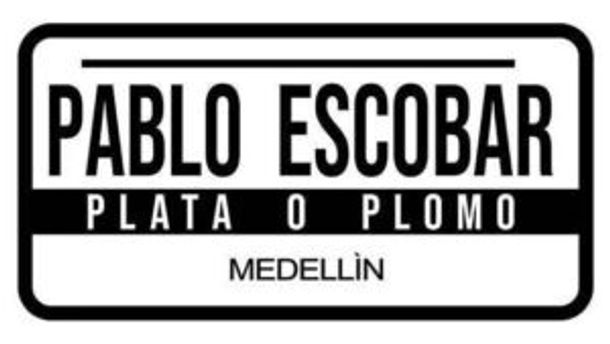
The European General Court recently rejected a trademark featuring Pablo Escobar. It was deemed immoral and inappropriate due to the serious criminal acts committed by the notorious drug dealer and narco-terrorist. But can a trademark be rejected simply for being in poor taste?
Introduction to the Topic
According to the EU Trademark Directive, trademarks must comply with public order and good morals. This means they cannot violate society's fundamental values or social norms.
However, this concept is not always clearly defined, which has historically led to uncertainty in how it should be assessed. Intellectual property offices in EU member states have had to rely mainly on subjective decisions, resulting in varied practices.
To ensure consistent trademark assessment, the EUIPO, together with the intellectual property offices of member states and user associations, developed the common practice CP14.
This common practice defines general principles for evaluating marks that may conflict with public order or good morals. It includes an understanding of these concepts, their relationship, criteria for assessment, and various types of marks that may be problematic, along with examples. Some are amusing, others offensive – let's look closer together!
But first: What exactly are "public order" and "good morals"?
Public order can be understood as a set of fundamental norms, principles, and values of the European Union. It encompasses general European values such as:
- Human dignity
- Freedom
- Equality and solidarity
Principles of democracy and the rule of law, as proclaimed in the Charter of Fundamental Rights of the European Union
Good morals refer to the basic moral values and standards that society in the European Union considers proper conduct at any given time. These moral values can change over time and vary between different countries. Therefore, in individual cases, consideration is given to what the relevant public deems acceptable behavior at that moment.
Since moral values are tied to beliefs, cultural backgrounds, and social bonds, it is important to consider:
- Religious values, which reflect the beliefs and practices of a particular religious group, such as respect for specific religious teachings, followers of the religion, rituals associated with the religion, sacred texts, sacred symbols, etc.
- Cultural values and norms, which reflect the traditions of the culture and the people who form it, such as respecting and protecting customs and traditions, rituals/ceremonies, cultural symbols, or the language of a particular group, etc.
- Social values and norms which reflect the identity of a community. These values generally stem from political, educational, and mutual social ties within a group and depend on the specific geographical and social context.
And now, the promised specific examples
To move from outrage to amusement and end on a cheerful note, let's first look at examples where the meaning of the mark or its conveyed message is so strong that the mark would be rejected regardless of the products or services the application pertains to.
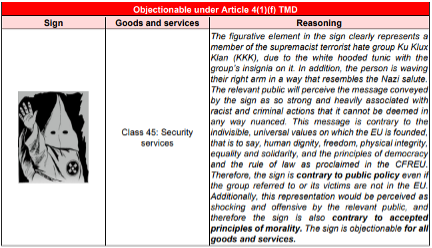
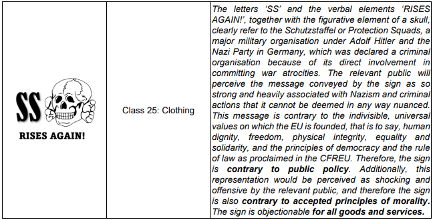
These marks and the products they represent are clearly racist and xenophobic, which blatantly contradicts the EU's values of equality. It's no surprise that they weren't registered. However, it's not always so clear-cut. Sometimes, whether a trademark is registered depends on the type of product it represents. For instance, a museum at Auschwitz named "Auschwitz Memories" is far less offensive than an amusement park with the same name.
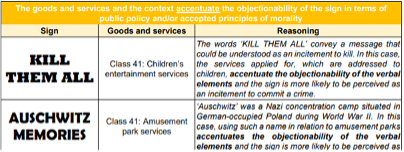

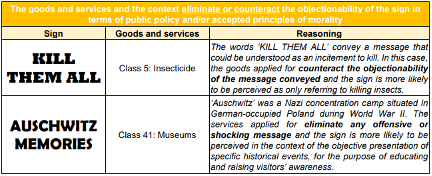
It's important to emphasize that assessing whether a mark complies with public order and good morals will always depend on the specific situation. These principles are based on the norms and values prevailing at the time and in society.
The common practice CP14 was unanimously adopted by the EUIPO management board in November 2023. The full text of this practice, along with a list of intellectual property offices and implementation dates, is available in the CP14 joint statement.